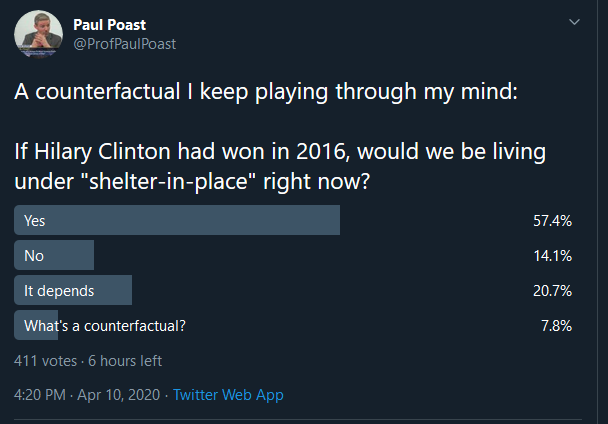#COVID19 poses a global threat to health.
So why is there no comprehensive, multilateral, cooperative response to the threat?
Is it because of...
- Leaders?
- State characteristics?
- The "Structure" of the International System?
[THREAD]
So why is there no comprehensive, multilateral, cooperative response to the threat?
Is it because of...
- Leaders?
- State characteristics?
- The "Structure" of the International System?
[THREAD]
To be clear, this thread is not about the international response to the economic crisis caused by how states are responding to #COVID19.
The economic response is pretty much, "Go to Fed. Pick up $$$$$$$" (cc @dandrezner). https://twitter.com/ProfPaulPoast/status/1243172840272265219">https://twitter.com/ProfPaulP...
The economic response is pretty much, "Go to Fed. Pick up $$$$$$$" (cc @dandrezner). https://twitter.com/ProfPaulPoast/status/1243172840272265219">https://twitter.com/ProfPaulP...
That response appears to be validating Charles Kindleberger https://twitter.com/ProfPaulPoast/status/1135146657463619586">https://twitter.com/ProfPaulP...
But with respect to the health threat posed by #COVID19?
Let& #39;s go through one factor at a time:
(1) leaders
(2) state characteristics
(3) system structure
Let& #39;s go through one factor at a time:
(1) leaders
(2) state characteristics
(3) system structure
1) Let& #39;s start with leaders.
Can& #39;t talk about ALL leaders, so let& #39;s focus on the one garnering most of the attention: @realdonaltrump
After all, his performance has been well documented.
Can& #39;t talk about ALL leaders, so let& #39;s focus on the one garnering most of the attention: @realdonaltrump
After all, his performance has been well documented.
He went from saying "this isn& #39;t really worth talking about"... https://twitter.com/realDonaldTrump/status/1236975196642390022">https://twitter.com/realDonal...
...to now making discussions of it one of his favorite daily activities https://twitter.com/realDonaldTrump/status/1244320570315018240">https://twitter.com/realDonal...
Of course, he is just one leader in the US who is important for responding to the crisis.
Governors have been critical, like @JBPritzker (which @chicagosmayor described bluntly)... https://twitter.com/chicagosmayor/status/1241770683090206721">https://twitter.com/chicagosm...
Governors have been critical, like @JBPritzker (which @chicagosmayor described bluntly)... https://twitter.com/chicagosmayor/status/1241770683090206721">https://twitter.com/chicagosm...
...Dewine... https://www.cincinnati.com/story/opinion/2020/04/02/opinion-8-lessons-dewine-acton-communications-playbook/5116956002/">https://www.cincinnati.com/story/opi...
... Cuomo https://www.cbsnews.com/news/andrew-cuomo-coronavirus-new-york-health-care-workers-covid-19/">https://www.cbsnews.com/news/andr...
One could say that the real action is even further down, at the county level https://twitter.com/austinlwright/status/1248763450895065088">https://twitter.com/austinlwr...
But that is all about the domestic response. What about leaders and international cooperation, a la Rathbun and @jkertzer in @World_Pol? https://www.cambridge.org/core/journals/world-politics/article/fair-is-fair-social-preferences-and-reciprocity-in-international-politics/93592DB517B278BE0FB31AE664CF121D">https://www.cambridge.org/core/jour...
Well, it hasn& #39;t helped that @realdonaldtrump keeps referring to #COVID19 as the "China virus" . That surely made it difficult for the US and China to work together https://twitter.com/realDonaldTrump/status/1239685852093169664">https://twitter.com/realDonal...
(2) Let& #39;s now consider states.
More precisely, do the characteristics of nation-states, most notably their system of government (i.e. "regime type"), explain international response to the crisis?
More precisely, do the characteristics of nation-states, most notably their system of government (i.e. "regime type"), explain international response to the crisis?
This is a topic of LONG interest to IR scholars, and a recent @IntOrgJournal piece by @ProfSaunders & @dshyde has injected life back into this topic https://www.cambridge.org/core/journals/international-organization/article/recapturing-regime-type-in-international-relations-leaders-institutions-and-agency-space/E1CD35C02F0A247A67D9E7BE361A5FC7">https://www.cambridge.org/core/jour...
In the case of #COVID19, folks want to know if democracies or autocracies performing "better"? https://twitter.com/demdigest/status/1247916616131772424">https://twitter.com/demdigest...
There is some suggestive evidence that democracies are better at reporting cases... https://twitter.com/ProfPaulPoast/status/1242932742897242114">https://twitter.com/ProfPaulP...
...which is a point @kroenig raises in a recent @TheAtlantic piece https://www.theatlantic.com/ideas/archive/2020/04/why-china-ill-equipped-great-power-rivalry/609364/?utm_source=twitter&utm_medium=social&utm_campaign=share">https://www.theatlantic.com/ideas/arc...
Related to this, @Republik_Baru points out that, overall, democracies seem better poised to protect their citizens from #COVID19 https://indonesiaatmelbourne.unimelb.edu.au/is-democracy-a-help-or-a-hindrance-in-fighting-pandemics/">https://indonesiaatmelbourne.unimelb.edu.au/is-democr...
But most of the above discussion focuses on the domestic response. What about international cooperation?
To be clear, bilateral assistance has been offered by democracies... https://www.state.gov/u-s-foreign-assistance-in-response-to-the-covid-19-pandemic/">https://www.state.gov/u-s-forei...
...and non-democracies https://www.cnn.com/2020/04/02/politics/russia-medical-supplies-us-propaganda/index.html">https://www.cnn.com/2020/04/0...
And there has been regional pooling of resources, such as by @NATO https://twitter.com/ProfPaulPoast/status/1245676767723106304">https://twitter.com/ProfPaulP...
But pooling of resources in a comprehensive, multilateral effort appears to be lacking https://twitter.com/smsaideman/status/1240377100546256898">https://twitter.com/smsaidema...
Most evident is the sidelining of the @WHO https://twitter.com/realDonaldTrump/status/1247540701291638787">https://twitter.com/realDonal...
This matters because the @WHO is well positioned to help coordinate a global response https://twitter.com/ProfPaulPoast/status/1240600125669609477">https://twitter.com/ProfPaulP...
But the @WHO hasn& #39;t been able to fully perform this function, especially early in the crisis https://twitter.com/ProfPaulPoast/status/1246418500152963073">https://twitter.com/ProfPaulP...
Is this because "mixed dyads" (i.e. a democracy and a non-democracy) tend not to cooperate well with one another (a la @hvm1 in @IntOrgJournal)? https://www.cambridge.org/core/journals/international-organization/article/why-democracies-cooperate-more-electoral-control-and-international-trade-agreements/ED2F62977DDD9FF6C5E0F5A15359E230">https://www.cambridge.org/core/jour...
(3) Let& #39;s now consider the international system.
In other words, could the global distribution of power possibly explain the lack of comprehensive, multilateral effort to stop COVID19?
In other words, could the global distribution of power possibly explain the lack of comprehensive, multilateral effort to stop COVID19?
At its most basic, we& #39;ve known for a long time that international cooperation is hard simply because you have a bunch of independent, sovereign states. https://www.cambridge.org/core/journals/world-politics/article/achieving-cooperation-under-anarchy-strategies-and-institutions/706B24B2FB4525D661BEB5E954D6DC49">https://www.cambridge.org/core/jour...
But "structural theories" of international politics, meaning those that focus on the distribution of power in the international system, typically focus on the behavior of the major powers.
In this case, the US and China have been involved in "blame shifting" rather than "cooperative balancing" against the threat of #COVID19 https://twitter.com/ProfPaulPoast/status/1238466631933874177">https://twitter.com/ProfPaulP...
The two sides appear to be seeking "relative gains" against one another. That& #39;s an idea most commonly associated with Neorealism https://www.cambridge.org/core/journals/american-political-science-review/article/absolute-and-relative-gains-in-international-relations-theory/0018BA1A141FE29A522EEDAA2A75826E">https://www.cambridge.org/core/jour...
It should be noted that, Russia, which is not on the same level in terms of power, is just sitting back letting the two sides take shots at one another https://twitter.com/ProfPaulPoast/status/1247852604547371008">https://twitter.com/ProfPaulP...
So, where does all of the above leave us at the moment?
Seems state characteristics and system structure have a lot going for them in terms of explaining the international response to the crisis.
Seems state characteristics and system structure have a lot going for them in terms of explaining the international response to the crisis.
One might wish to place more weight on structure or on domestic institutions (as the exchange b/w @mchorowitz & myself), but neither can be totally dismissed. https://twitter.com/mchorowitz/status/1248787107352625152">https://twitter.com/mchorowit...
In sum, "global distribution of power" and "democracy & non-democracies" both help explain the lack of international cooperative response to a global threat.
[END]
[END]

 Read on Twitter
Read on Twitter



